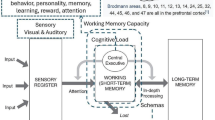Abstract
To provide personalization and adaptivity in technology enhanced learning systems, the needs of learners have to be known by the system first. Detecting these needs is a challenging task and therefore, mechanisms that support this task are beneficial. This paper discusses the relationship between learning styles, in particular the Felder-Silverman learning style model, and working memory capacity, a cognitive trait. Due to this relationship, additional information about the learner is available and can be used to improve the student model. An exploratory study is presented to verify the identified relationship based on the literature. The results of the study show that the identified relationship between working memory capacity and two of the four dimensions of the learning style model is significantly supported. For the two remaining dimensions further research is required.
This research has been partly funded by the Austrian Federal Ministry for Education, Science, and Culture, and the European Social Fund (ESF) under grant 31.963/46-VII/9/2002 and partly by Online Learning Systems Ltd in conjunction with the New Zealand Foundation for Research, Science & Technology.
Preview
Unable to display preview. Download preview PDF.
Similar content being viewed by others
References
Baddeley, A.D.: Working Memory. Oxford University Press, Oxford (1986)
Brusilovsky, P.: The Construction and Application of Student Models in Intelligent Tutoring Systems. Journal of computer and systems sciences international 32(1), 70–89 (1994)
Deary, I.J., Whiteman, M.C., Starr, J.M., Whalley, L.J., Fox, H.C.: The Impact of Childhood Intelligence on Later Life: Following Up the Scottish Mental Surveys of 1932 and 1947. Journal of Personality and Social Psychology 86(1), 130–147 (2004)
De Neys, W., d’Ydewalle, G., Schaeken, W., Vos, G.: A Dutch, computerized, and group administrable adaptation of the operation span test. Psychologica Belgica 42, 177–190 (2002)
Felder, R.M., Silverman, L.K.: Learning and Teaching Styles in Engineering Education. Engineering Education 78(7), 674–681 (1988)
Felder, R.M., Soloman, B.A.: Index of Learning Styles Questionnaire, Online version (1997) (retrieved May 6, 2006), from http://www.engr.ncsu.edu/learningstyles/ilsweb.html
Graf, S., Lin, T.: Kinshuk: Improving Student Modeling: The Relationship between Learning Styles and Cognitive Traits. In: Proceedings of the International Conference on Cognition and Exploratory Learning in Digital Age, Portugal, pp. 37–44 (2005)
Lin, T., Kinshuk, Patel, A.: Cognitive Trait Model - A Supplement to Performance Based Student Models. In: Proceedings of International Conference on Computers in Education, Hong Kong, pp. 629–632 (2003)
Miller, G.: The magic number seven, plus or minus two: Some limit of our capacity for processing information. Psychology Review 63(2), 81–96 (1956)
Richards-Ward, L.A.: Investigating the relationship between two approaches to verbal information processing in working memory: An examination of the construct of working memory coupled with an investigation of meta-working memory, Massey University, Palmerston North, New Zealand (1996)
Salthouse, T.A., Mitcheel, D.R.D., Skovronek, E., Babcock, R.L.: Effects of adult age and working memory on reasoning abilities. Journal of Experiemental Psychology: Learning, Memory, and Cognition 15, 507–516 (1989)
Turner, M.L., Engle, R.W.: Is working memory capacity task dependent? Journal of Memory and Language 28, 127–154 (1989)
Author information
Authors and Affiliations
Editor information
Editors and Affiliations
Rights and permissions
Copyright information
© 2006 Springer-Verlag Berlin Heidelberg
About this paper
Cite this paper
Graf, S., Lin, T., Jeffrey, L., Kinshuk (2006). An Exploratory Study of the Relationship Between Learning Styles and Cognitive Traits. In: Nejdl, W., Tochtermann, K. (eds) Innovative Approaches for Learning and Knowledge Sharing. EC-TEL 2006. Lecture Notes in Computer Science, vol 4227. Springer, Berlin, Heidelberg. https://doi.org/10.1007/11876663_38
Download citation
DOI: https://doi.org/10.1007/11876663_38
Publisher Name: Springer, Berlin, Heidelberg
Print ISBN: 978-3-540-45777-0
Online ISBN: 978-3-540-46234-7
eBook Packages: Computer ScienceComputer Science (R0)




